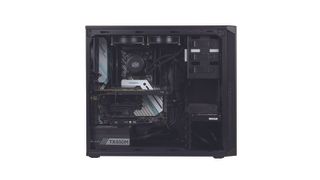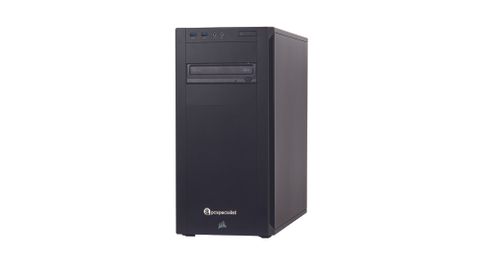IT Pro Verdict
The PC Specialist Apollo X02 isn’t the perfect pure 3D modelling workstation. What it gains in CPU-intensive tasks it loses in frequency-intensive ones. But its modelling abilities are still very good, and hardly going to hold back your workflow, whereas there are obvious time savings to be made when rendering your 3D or encoding video. This gives the PC Specialist Apollo X02 the edge amongst other £2,500 workstations.
Pros
- +
Outstanding 3D rendering and video encoding performance; Good value
Cons
- -
3D modelling skills aren’t amazing; Weedy SSD speeds
PC Specialist is unusual in the sub-2,500 bracket in that it hasn't gone for the excellent new six-core Coffee Lake Intel Core i7-8700K. Instead, the Apollo X02 is based around the equally brilliant eight-core Intel Core i7-7820X, so you're getting a couple of extra cores for your money.
Although the 7820X isn't as recently released as the 8700K, it's still only been around for a relatively short period. This is a Skylake-X CPU like the Core i9 processors in Scan's 3XS VI6000 Viz and Workstation Specialists' WS-X1180. Where the Core i9 has ten or more cores, the Core i7 Skylake-X tops out at eight, but the 7820X has a much higher nominal clock speed of 3.6GHz -- and PC Specialist has pumped all eight cores up to 4.6GHz.
Unusually, PC Specialist has chosen air rather than watercooling. However, the Noctua NH-U14S is one of the most capable air coolers on the market, and more than capable of keeping the temperature of the overclocked processor under control.
Backing up the processor is a capable 32GB allocation of 3,000MHz DDR4 SDRAM. This comes in the form of four 8GB sticks, and if you want to boost this to the maximum limit of 128GB, you can use the motherboard's four extra slots. Since this is a Skylake-X processor, it offers quad-channel memory for increased bandwidth, rather than the dual-channel configuration of the 8700K.
Like most recent workstations, this model is sporting an Nvidia Quadro P4000, and with good reason; for less than 1,000, this card offers truly top-notch professional-grade 3D graphics acceleration, thanks to 8GB of GDDR5 memory and 1,792 CUDA cores.
This unit has a 2TB Seagate Barracuda Pro SATA HDD for mass storage, while the OS and applications are stored on a 500GB Samsung 960 Evo m.2 NVMe SSD - a pretty run-of-the-mill configuration. The SSD is one of the slower units commonly seen on workstations of this price bracket, with 2.3GB/sec reading and 1.8GB/sec writing, but the hard disk is one of the quicker models, reading at 211MB/sec and writing at 199MB/sec.

PC Specialist has also found space in the budget for a DVD writer. The Corsair Carbide 200R case has space for an extra three 3.5in drives too, and they're a snap to get at thanks to the handy side panel. This means you can beef up the storage capacity even more if you need, although sadly they don't support hot-swapping.
The extra two CPU cores pay dividends when the Apollo X02 is performing rendering tasks. The Maxon Cinebench R15 CPU score of 1,830 is more than 10% faster than rival 8700K-based systems, although not a patch on the scores achieved by machines sporting Core i9s or AMD Threadripper chips. Similarly, the Blender render duration of 2,039 seconds is 10% quicker than other 2,500 workstations when using the CPU; like all but many workstations, the graphics accelerator doesn't have enough memory to render in GPU.
Turning to the IT Pro benchmarks, the Apollo X02 was comparatively slow for image editing, but its video encoding was 6% faster than its direct competitors, and 12% faster for multitasking, giving it a 7% speed advantage overall. With Adobe Media Encoder, the Apollo X02 can't compete with more expensive systems, but it's at least 9% quicker than other machines in its price category.
The 3D modelling abilities aren't so dominant, however, due to the clock speed disadvantage compared to 8700K-based systems. The Maxon Cinebench R15 result of 170 wasn't overly impressive, and SPECviewperf 12.1 results were a mixed bag. The 3ds Max score of 123 was a little disappointing, as was the Maya result of 99, Creo result of 109 and 150 in Catia. However, with other viewsets the Apollo X02 fared better, sitting in the middle of the pack with SolidWorks for example.
In other words, the PC Specialist Apollo X02 isn't the perfect pure 3D modelling workstation. What it gains in CPU-intensive tasks it loses in frequency-intensive ones. But its modelling abilities are still very good, and hardly going to hold back your workflow, whereas there are obvious time savings to be made when rendering your 3D or encoding video. This gives the PC Specialist Apollo X02 the edge amongst other 2,500 workstations.
Verdict
The PC Specialist Apollo X02 isn’t the perfect pure 3D modelling workstation. What it gains in CPU-intensive tasks it loses in frequency-intensive ones. But its modelling abilities are still very good, and hardly going to hold back your workflow, whereas there are obvious time savings to be made when rendering your 3D or encoding video. This gives the PC Specialist Apollo X02 the edge amongst other £2,500 workstations.
| Processor | 3.6GHz Intel Core i7-7820X overclocked to 4.6GHz |
| Expansion slots free/total | 8 x RAM slots (4 free), 3 x PCI-E x16 (2 free), 2 x PCI-E 4x (2 free), PCI-E 1x (1 free), M.2 socket (0 free), 8 x SATA 600 (7 free) |
| RAM fitted/speed | 32GB DDR4 3,000MHz |
| GPU | PNY Quadro P4000 8GB |
| Outputs | 4 x DisplayPort 1.4, stereo (via adapter) |
| SSD | Samsung 960 Evo 500GB NVMe M.2 PCI Express |
| Hard disk | Seagate Barracuda Pro 2TB |
| Optical drive | Hitachi-LG Data Storage DVD-RAM writer |
| Rear ports | Gigabit Ethernet, 4 x 3.5mm audio jack, 3.5mm microphone jack, optical S/PDIF, 4 x USB 3.1 Gen 1, USB 3.1 Gen 2 (Type A), USB 3.1 Gen 2 (Type C), 4 x USB 2 |
| Front/top ports | 3.5mm audio jack, 3.5mm microphone jack, 2 x USB 3 |
Dr James Morris has worked as a technology journalist for over 25 years, including spending nine years on the staff of market-leading computer magazine PC Pro, the last five of which were as the publication’s editor. He specialises in enterprise-grade software and hardware, with a particular focus on content creation. He launched a pioneering video channel for HEXUS.net in 2006 and ran the video reviews channel for TrustedReviews.com for four years. He also runs a successful online digital content and commercial video production company, t-zero communications Ltd.
Dr Morris is a prolific technology writer and contributes commercial content for major IT brands including AMD, BlackBerry, Dell, Cognizant, HP, and IBM. He published a book on artificial intelligence, Can Computers Create Art? in 2009. He is also an academic, and is currently Pathway Director of the MA, Interactive Journalism at City, University of London.
Previously, he was course leader for the BA in Web Media Production at Ravensbourne University. He has a PhD in Philosophy, Art and Social Thought from the European Graduate School in Switzerland, a Master's in Media Arts from the New School in New York, USA, and a Bachelor's in Social Anthropology from the London School of Economics.
Dr. Morris can be found on Twitter at @Cyberwest, or emailed at j@tzero.co.uk



